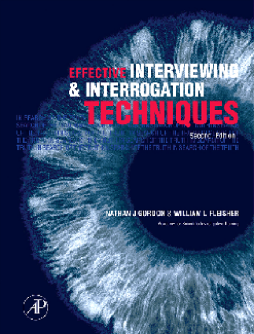
BOOK
Effective Interviewing and Interrogation Techniques
Nathan J. Gordon | William L. Fleisher
(2006)
Additional Information
Book Details
Abstract
Effective Interviewing and Interrogation Techniques, Second Edition, is completely revised and updated so as to cover all the information a student needs to know to obtain answers from a witness, a victim, or a suspect and how to interpret these answers with the utmost accuracy.
Building on the previous edition’s ground-breaking search for truth in criminal and non-criminal investigations, this book contains five new chapters which include coverage of false confessions, interviewing the mentally challenged, and the ethics of interrogation in a post 9/11 world. This new edition includes highly illustrated chapters with topics ranging from the psycho-physiological basis of the forensic assessment to preparation for the interview/interrogation; question formulation; projective analysis of unwitting verbal clues; interviewing children and the mentally challenged; and pre-employment interviewing. Also included are several model worksheets and documents, case studies, and complete instructions for using the authors’ Integrated Interrogation Technique, a 10-point, highly successful approach to obtaining confessions that can stand up in court. The book concludes with an insightful look at the future of truth verification.
This book will be of benefit to attorneys, coroners, detectives, educators, forensic psychophysiologists (lie detection), human resource professionals, intelligence professionals, and investigators as well as journalists/authors, jurists, medical professionals, psychological professionals, researchers, and students.
- Expanded coverage of Statement Analysis, including actual statements from real cases.- New photos to aid in assessing nonverbal behavior.
- Added section on assessment of written statements.
"The authors have described a very generalizable and useful interviewing technique that is easy to learn, simple to use, and can significantly improve the ability to discern truth from deception in a manner that is both interesting and engaging."
--J Police Crim Psych (2008) 23:45-47
